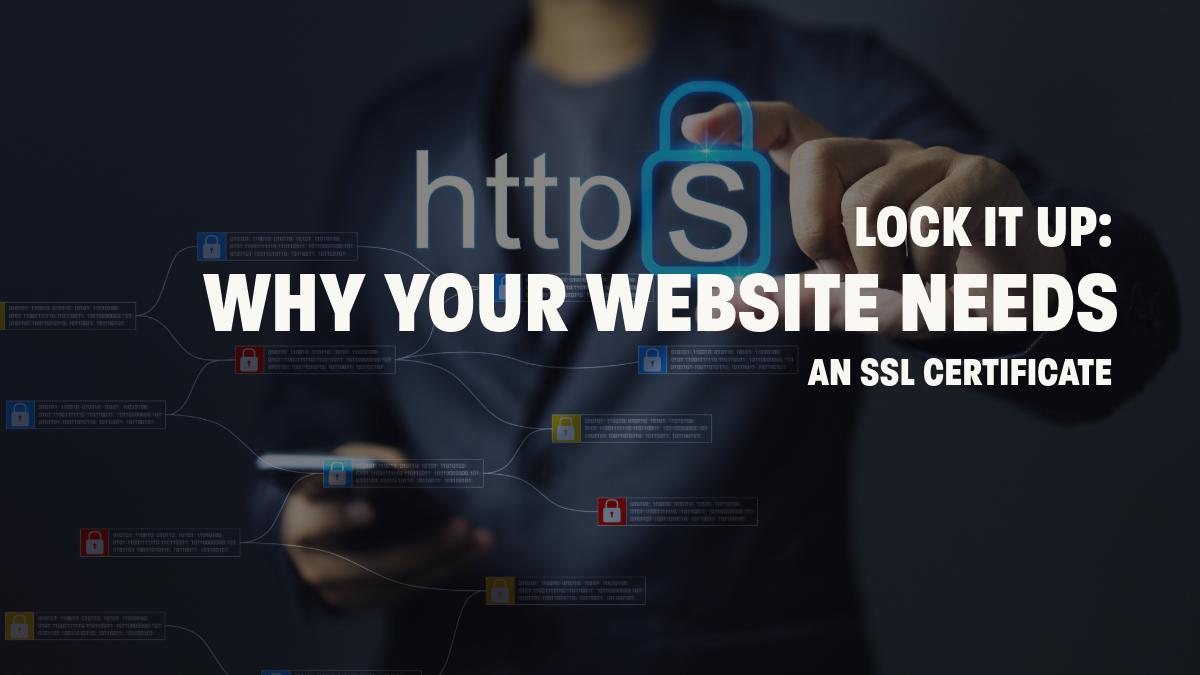If you’re running a site—whether it’s a personal blog, an e-commerce store, or just a basic informational website. Then you may have heard about SSL certificates. But what exactly is an SSL, and why is it so important for your website? Let’s break it down in a way that’s clearer so you can understand why its important.
What Is an SSL Certificate?
An SSL (Secure Sockets Layer) certificate is like a digital passport for your website. It’s a small data file that establishes a secure, encrypted connection between your web server and a visitor’s browser. Think of it as a secret handshake that ensures data—like login credentials, credit card numbers, or personal details—stays private and protected as it travels across the internet.
When a website has an SSL certificate, you’ll see a padlock icon in the browser’s address bar, and the URL starts with “https://” instead of “http://”. That extra “s” stands for “secure,” signaling to users that your site takes their privacy seriously. At Your Page Today LLC, we know how important it is to build trust with your audience, and an SSL certificate is a key step in making that happen.
How Does an SSL Certificate Work?
Picture the internet as a busy highway where data zooms back and forth. Without protection, that data is like an open letter anyone can read. An SSL certificate encrypts the information, turning it into a scrambled code that only the intended recipient (your website or the user’s browser) can decode. This process relies on two keys: a public key to encrypt the data and a private key to decrypt it.
Here’s a quick rundown of how it happens:
-
User Visits Your Site: When someone lands on your website, their browser requests a secure connection.
-
Certificate Verification: Your server shares the SSL certificate, which includes the public key, with the browser.
-
Secure Connection Established: The browser verifies the certificate with a trusted Certificate Authority (like Let’s Encrypt or DigiCert). If it checks out, a secure session begins.
-
Data Encryption: Any information exchanged—like form submissions or payment details—is encrypted, keeping it safe from prying eyes.
This process happens in milliseconds, so your visitors don’t notice a thing. But behind the scenes, it’s working hard to keep their data secure.
Why Your Website Needs an SSL Certificate
If you’re wondering whether an SSL certificate is worth the effort, the answer is a resounding yes. Here are the top reasons why every website, including yours, needs one:
1. Protects Sensitive Data
Your visitors share all kinds of information with your site—names, emails, passwords, or even payment details if you’re running an online store. Without an SSL certificate, hackers could intercept this data, leading to identity theft, financial loss, or worse. An SSL certificate ensures that sensitive information stays encrypted and secure, giving your users peace of mind.
2. Builds Trust with Visitors
First impressions matter. When users see the padlock icon and “https://” in their browser, they know your site is legitimate. In fact, studies show that 84% of users are more likely to trust a website with HTTPS. For a company like Your Page Today LLC, where credibility is key to attracting clients, an SSL certificate signals professionalism and reliability.
On the flip side, browsers like Chrome and Firefox now flag non-HTTPS sites with a “Not Secure” warning. This red flag can scare visitors away, especially if they’re about to share personal information or make a purchase. An SSL certificate helps you avoid this trust-killer and keeps your audience engaged.
3. Boosts Your SEO Rankings
Search engines like Google prioritize secure websites. Since 2014, Google has used HTTPS as a ranking signal, meaning sites with SSL certificates tend to rank higher than those without. For Your Page Today LLC, this is a game-changer. Higher rankings mean more visibility, more clicks, and more opportunities to connect with your audience. In a competitive online space, every edge counts.
Additionally, an SSL certificate verifies that the domain matches its rightful owner. For example, if a website claims to be a well-known brand like Best Buy, the SSL certificate requires proof that the domain is legitimately owned by that entity. This verification process, handled by trusted Certificate Authorities, ensures authenticity, which is why search engines like Google favor HTTPS websites. By confirming your domain’s ownership, you’re building a foundation of trust with both your visitors and search engines.
4. Meets Industry Standards
If your website processes payments, an SSL certificate isn’t just a nice-to-have—it’s a must. Payment Card Industry (PCI) compliance requires HTTPS for any site handling credit card transactions. Even if you’re not selling products, many third-party tools, like analytics or payment gateways, require a secure connection. An SSL certificate ensures your site meets these standards, keeping you in good standing with partners and customers.
5. Prevents Data Tampering
Hackers don’t just steal data—they can also manipulate it. Without SSL, someone could alter the content of your website as it travels to your users, displaying fake information or malicious links. An SSL certificate ensures that what your visitors see is exactly what you intended, preserving your site’s integrity.
Common Myths About SSL Certificates
Let’s clear up a few misconceptions that might be holding you back:
-
“SSL is only for e-commerce sites.” Not true! Any website that collects data—like contact forms or login pages—benefits from SSL. Even informational sites gain trust and SEO perks.
-
“SSL slows down my site.” Modern SSL certificates have minimal impact on performance. In fact, HTTPS can sometimes improve load times thanks to newer protocols like HTTP/2.
-
“SSL certificates are expensive.” Not anymore! Free options like Let’s Encrypt make it easy for any website owner to go secure without breaking the bank.
How to Get an SSL Certificate for Your Website
Ready to secure your site? Here’s a simple roadmap:
-
Choose a Certificate Type: For most small businesses or blogs, a Domain Validated (DV) SSL certificate is enough. Larger organizations might opt for Organization Validated (OV) or Extended Validation (EV) certificates for extra trust.
-
Pick a Provider: Your Page Today LLC can guide you through options like Let’s Encrypt (free) or paid providers like DigiCert or GoDaddy for premium features.
-
Install the Certificate: Your web hosting provider often simplifies this process. Many hosts, like those partnered with Your Page Today LLC, offer one-click SSL installation.
-
Update Your Site: Ensure all links use “https://” and set up redirects from HTTP to HTTPS to avoid broken links.
-
Monitor and Renew: SSL certificates expire (usually annually), so set reminders to renew them to keep your site secure.
Why Your Page Today LLC Recommends SSL
At Your Page Today LLC, we’re passionate about helping businesses build websites that are fast, functional, and trustworthy. An SSL certificate is a non-negotiable part of that equation. It protects your visitors, strengthens your brand, and gives you a competitive edge in search rankings. Whether you’re a small business owner or a growing enterprise, securing your site with HTTPS is one of the easiest ways to show your audience you mean business.
Take Action Today
Don’t let your website be the one that scares visitors away with a “Not Secure” warning. An SSL certificate is a small step with big rewards—safer data, happier users, and better visibility. If you’re ready to make your site secure, Your Page Today LLC is here to help. Contact us to learn how we can set up your SSL certificate and keep your website shining in the online world.
Lock it up, and let’s build a safer, stronger web together!


